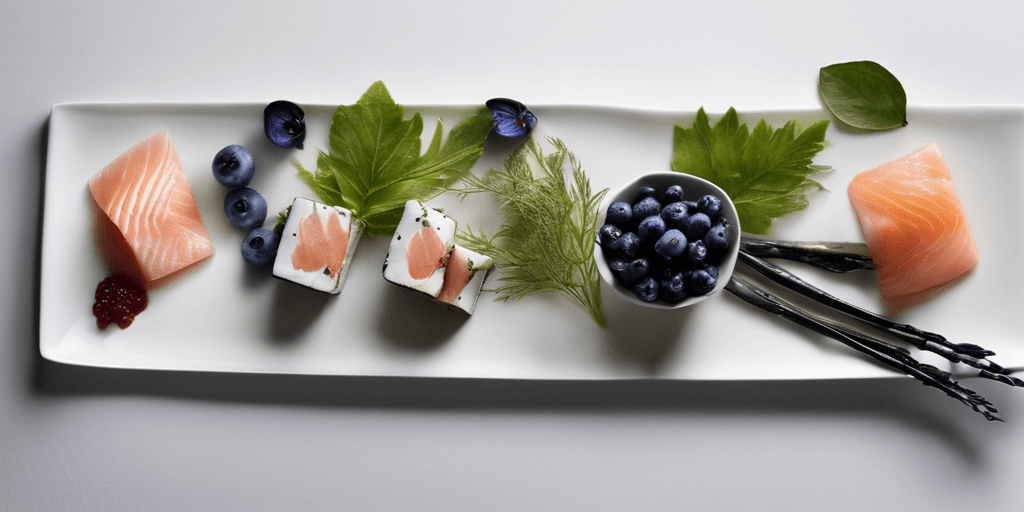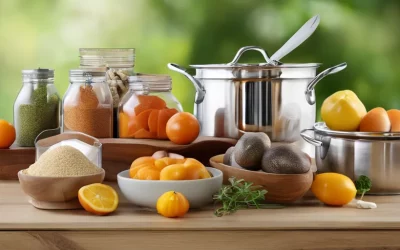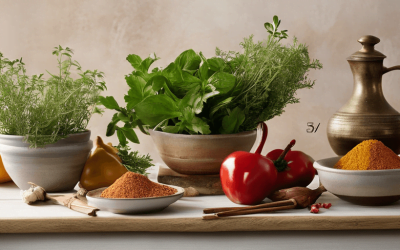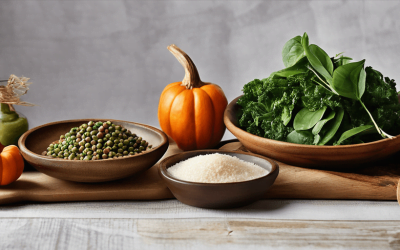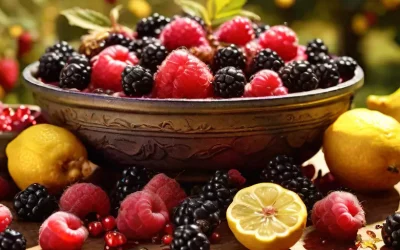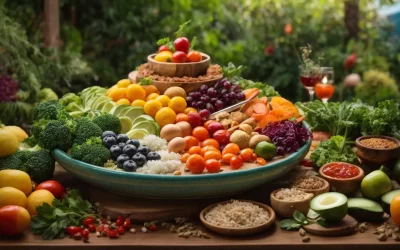Understanding the role of the water element in Traditional Chinese Medicine (TCM) can be a game-changer for your health and wellness. Incorporating it into your diet can promote balance and harmony in your body’s energy flow. Let’s delve into the practical ways to include the water element in your daily meals.
To include the water element in your diet, consume foods associated with the yin element such as black beans, seaweed, tofu, and certain types of tea. Hydrate frequently and maintain a balanced diet for optimal health.
Curious to know more about how the water element can enhance your overall well-being? Dive into the following sections to learn more about the benefits of these foods and how to seamlessly incorporate them into your everyday meals.
- Role of Kidneys and Urinary Bladder
- Significance of Blue/Black Foods
- Influence of Salty Taste on Diet
- Dietary Tips for Balancing Water Element
- Practical Water Element-Centric Recipe Guide
- Incorporating Water Element Successfully
- Discover Harmony with Elemental Eating
Role of Kidneys and Urinary Bladder
TCM and Water Element Organs
In Traditional Chinese Medicine (TCM), kidneys and bladder are linked to the water element, while liver qi, yin, yang, and skin are also vital components. They’re like BFFs, always together.
Diet Impact on Kidney and Bladder Function
The foods you consume can either be a game-changer or a deal-breaker for your liver and skin, impacting your nutrition significantly. Nutritious foods help boost their system function while junk food could land them in nutritional trouble.
- Beans: These are the kidney’s best pals. These nutrition-rich foods provide essential nutrients that help keep your liver and kidneys running smoothly.
- Water: It’s no brainer that water is crucial for both kidneys and liver, two vital organs. This vital fluid, along with foods rich in nutrition, supports these organs’ function. It helps flush out toxins, keeping these organs clean.
Foods Supporting Kidney and Bladder Health
TCM recommends certain nutrition-rich foods to help keep your kidneys and bladder in top shape, manage yang levels, and alleviate symptoms.
- Fish, a nutritious food high in omega-3 fatty acids, can help support kidney health and other organ functions.
- Berries, nutritious foods loaded with antioxidants, help protect your body’s organ, specifically your kidneys, from damage.
Consequences of Imbalance
Ignoring dietary recommendations and proper nutrition can lead to an imbalance in these body organs, and the right foods can help restore balance. And trust me, you don’t want that! Consuming certain foods can help your organ health, potentially reducing issues like kidney stones or urinary tract infections in the body.
Remember folks, our body is like a finely tuned system where every organ and meridian plays its part. Food can help keep this machine running smoothly. When one organ in the body suffers due to poor choices in foods, it can affect the whole system, including the heart, lungs, liver, stomach etcetera. The right foods can help maintain a healthy balance. Let’s make wise choices for the foods we eat, because as they say “you are what you eat”, and our body, organ, and system depend on it.
Significance of Blue/Black Foods
Tying Blue/Black Foods to Water
In Traditional Chinese Medicine (TCM), different colors align with various elements, foods, and organ systems. The color blue or black represents the water element.
Influence of Salty Taste on Diet
TCM and Salty Foods
Traditional Chinese Medicine (TCM) links the salty taste to the water element. Just like a flowing river, it’s all about balance.
Salt Intake and Health
Too much or too little salt can mess up your health. High salt intake might cause hypertension, while less salt may lead to hyponatremia.
Balancing Salty Flavors
TCM principles stress balancing salty flavors for optimal wellness. It’s not about cutting out salt completely, but using it wisely.
- Use garlic or onions for flavor
- Try sour foods like fruits
- Opt for soups during colder seasons
Managing Salt Consumption
Managing salt consumption without compromising taste is possible. Here are some tips:
- Gradually reduce your salt intake.
- Swap table salt with herbs and spices.
- Read food labels carefully.
Remember, night sweats could be a sign of yang deficiency in TCM, which means you need more warming foods in your diet.
Dietary Tips for Balancing Water Element
Select Suitable Food Items
Incorporating the water element in your diet starts with choosing the right food items. Yin foods like watermelon, pears, and radishes are great choices.
- Watermelon: This juicy fruit helps maintain fluid balance.
- Pears: Pears are perfect for nourishing yin and clearing heat.
- Radishes: They help dissolve mucus and clear liver qi stagnation.
Time Your Meals Right
Meal timing is crucial in Traditional Chinese Medicine (TCM). It’s best to eat when your body energy or ‘qi’ is at its peak. For example, liver qi peaks between 1 am and 3 am.
Portion Control and Cooking Methods Matter
A balanced diet involves portion control too. Overeating can lead to a yin deficiency. Also, opt for cooking methods that don’t drain the nutritional value of your food.
Detect Imbalances Early On
Changes in well-being or mild anxiety symptoms may indicate an imbalance. Stay attuned to these signs to maintain optimal health.
Adjust Dietary Habits as Needed
If you spot any signs of imbalance, adjust your dietary habits promptly. Incorporate more herbs into your meals or switch up the vegetables you consume regularly.
Practical Water Element-Centric Recipe Guide
Simple Recipes with Key Ingredients
Water element in your diet, huh? Sounds like a big deal, but it’s as simple as pie. Think of foods that make you feel warm and fuzzy inside. Stews, soups, black beans – they’re all water-element friendly.
- Black Bean Soup
- Mushroom Stew
- Seaweed Salad
Get the idea?
Preparing Balanced Meals
You gotta balance things out. It’s not just about what you eat but how you prepare it too. The goal is to nourish your body while keeping your water element in check.
- Cook at low heat.
- Use less oil.
- Add spices for flavor.
Remember these principles and you’re good to go!
Customizing Recipes
Now here’s the fun part! You get to play around with the recipes based on what works for you.
- Love spicy food? Add more chili!
- Not a fan of mushrooms? Swap them out for tofu!
Below you can find some easy water element recipes.
Meal Time | Recipe Name | Ingredients | Instructions |
Breakfast | Oatmeal with Blueberries | Oats, blueberries, water | Cook oats in water, top with blueberries |
Chia Pudding | Chia seeds, almond milk, honey | Mix chia seeds with almond milk and honey, let it sit overnight | |
Avocado Toast | Bread, avocado, salt, pepper | Toast bread, smash avocado on top, season with salt and pepper | |
Lunch | Black Bean Soup | Black beans, onions, garlic, spices | Cook all ingredients in a pot at low heat |
Seaweed Salad | Seaweed, sesame oil, soy sauce, sugar | Mix all ingredients together | |
Quinoa Salad | Quinoa, cucumbers, tomatoes, olive oil | Cook quinoa, mix with cucumbers and tomatoes, dress with olive oil | |
Dinner | Mushroom Stew | Mushrooms, onions, garlic, spices | Cook all ingredients in a pot at low heat |
Spicy Tofu Stir-fry | Tofu, vegetables, chili, soy sauce | Fry tofu and vegetables in less oil, add chili and soy sauce | |
Lentil Soup | Lentils, onions, carrots, spices | Cook all ingredients in a pot at low heat |
The world is your oyster here.
If you’re looking to learn more about The Five Elements Diet and how to create healthy meals, you can find additional information here.
Enjoying the Process and Savoring Flavors
This ain’t no race! Take time to enjoy the process of cooking and savor every bite of your meal. This way, you’re not just feeding your body but also nourishing your soul.
Incorporating Water Element Successfully
By now, you should have a comprehensive understanding of how to incorporate the water element into your diet according to Traditional Chinese Medicine (TCM) principles. The role of kidneys and urinary bladder, the importance of blue/black foods, the influence of salty taste in your food, and practical dietary tips all play a crucial part in maintaining a balanced water element. Our recipe guide provides an easy start to integrating these concepts into everyday meals.
Remember, achieving balance is essential for optimal health. Encourage yourself to experiment with these guidelines and discover what suits your body best. If you’re unsure or have specific health concerns, consider seeking advice from a qualified TCM practitioner. Don’t forget that every small step towards better health counts!
Discover Harmony with Elemental Eating
Explore the realm of Elemental Eating, a philosophy rooted in Traditional Chinese Medicine, designed to harmonize your well-being by balancing the five essential elements: earth, metal, water, wood, and fire. In this introductory article on the elements diet, delve into the intricate connection between these elements and their unique energetic properties and nutritional significance. Uncover the fundamental principles of tailoring your diet to meet your individual elemental requirements, fostering health, and guarding against ailments.
For an in-depth understanding, explore our comprehensive guides on optimizing vitality with the Metal Element Diet, cultivating stability through the Earth Element Diet, igniting passion with the Fire Element Diet, and delving into the nourishing world of the Wood Element Diet for complete elemental nourishment.
FAQ
What are some examples of blue/black foods?
Blue/black foods include black beans, black sesame seeds, blackberries, blueberries etc., which are believed to nourish the kidney energy in TCM.
How does incorporating the water element benefit my health?
Balancing the water element can help maintain kidney function, support detoxification processes, and potentially improve longevity according to TCM principles.
Can I overdo it with salty flavors in my diet?
Yes, while salty flavors can be beneficial in moderation as they support kidney function in TCM theory; excessive salt consumption can lead to imbalances such as high blood pressure.
Where can I find more water-centric recipes?
You can refer back to our “Practical Water Element-Centric Recipe Guide” section for starters. Consulting with a TCM practitioner or nutritionist may provide more personalized suggestions.
Do I need professional guidance before incorporating these changes into my diet?
While this guide offers general advice on balancing the water element through diet based on TCM principles; individual needs may vary greatly. Therefore, it’s always recommended to consult with a healthcare professional or TCM practitioner for personalized advice.
Can I incorporate these changes into my child’s diet?
Yes, you can incorporate these changes into your child’s diet, but it’s advisable to do so with the guidance of a pediatrician or a TCM practitioner who specializes in children’s health.

